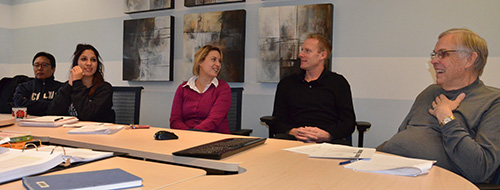Dr. Fred Luthans, University and George Holmes Distinguished Professor of Management, is retiring this semester after 48 years of service at the College of Business Administration – nearly half the age the college itself has been in existence at the University of Nebraska–Lincoln. His tenure at CBA is highlighted by some of the most prominent accomplishments in the history of the university, including writing the first textbook in the field of organizational behavior and founding the area of study known as psychological capital.
Luthans’ experiences have put him in touch both with the people who worked at CBA during its early years and those who are leading the college into a new era of unprecedented reputation in the Big Ten.
“One of the professors Warren Buffett always credits with teaching him accounting was Ray Dean,” Luthans said. “Dean was a colleague of mine, as was Campbell McConnell from the Department of Economics, who wrote the number one textbook in any field.”
Those connections at CBA along with reuniting with his college mentor from the University of Iowa laid the groundwork for Luthans’ success.
“Henry Albers came here shortly after I arrived and became the first chair in management at CBA. We only had two business majors then – business administration and economics. Albers got the Department of Management going, and I was one of his protégés so it helped my career considerably.”
Luthans’ work before arriving at Nebraska also furthered his career.
“After earning my Ph.D. at Iowa, I had to go into the military because this was the buildup of the Vietnam War. I went in as an ROTC commissioned officer and taught leadership and motivation to cadets at West Point.”
The experience proved extremely useful when CBA started a master’s program at Offutt Air Force Base, and Luthans taught the very first program offered. In addition to teaching courses he also helped create the MBA program during an early two-year stint as associate dean whereby he was charged with initiating the new program.
However, perhaps Luthans most significant contribution at CBA ultimately happened through his research in the area of organizational behavior.

Luthans with Ph.D. students
“I wrote the first textbook in organizational behavior, and it’s now by far the biggest field in all of management. Organizational behavior is applied psychology that focuses on the behavioral side of management and is still going strong today. I was lucky enough to be on the ground floor but I had no other textbook to look at when I wrote mine which is now in its twelfth edition.”
Helping lay the groundwork for such a significant field of study would seem to be enough for one career, but Luthans did not stop there.
“Back in the 90s, the Gallup Corporation held the first summit in the field of positive psychology. I attended and while I was sitting in the audience I had a trigger moment where I realized I could take positive psychology to the workplace. I founded the approach I called positive organizational behavior. Then I applied it to the workplace with what I called psychological capital, which has now taken off as a field all its own.”
Luthans has traveled the world in recent years speaking on the subject of psychological capital and serving as a top consultant with companies as large as China Mobile who employs 500,000 people.
“I took the constructs from positive psychology that met my four criteria of being theory and research driven, able to be measured through the scientific peer review process, open to development so we could manage people’s psychological capital and because I am in a business school it had to have performance impact. That was my quest and I believe I’ve been very successful doing that in the field of psychological capital.”
Luthans, who was also elected president of the Academy of Management in 1986, is proud not only of his own accomplishments but also on the new direction of the college.
“Dean Donde Plowman has done great things leading us into the Big Ten. We have the opportunity to be one of the top business schools in the country bar none. We have to understand it’s all our mindset, and we’re on the cutting edge of great new things at the college. I think joining the Big Ten is the best thing that happened to me in my career. It’s huge in terms of the value of our degree and I feel so proud to be part of it.”
Published: April 21, 2015